The mystery of a 100-year-old letter sent from Manitoba to Ireland is slowly unraveling thanks to the work of one amateur sleuth.
The letter was found inside a bombed-out solicitor’s office in an Irish townland by Calgary resident Carol Cowie’s father, Robert White, in 1972.
“My father worked for an architect office at the time, and it was during the Troubles,” Cowie told CTV News Winnipeg. “He was responsible for going around and assessing buildings to see if they should be torn down or rebuilt.”
Cowie said the office was slated for demolition after it was damaged by a car bomb. Her father was doing a final walkthrough when he came across an inconspicuous envelope in the building’s attic. She said he was a stamp collector, and the postage on the envelope caught his eye.
“He was interested in the two stamps because they were [Irish] Free State stamps, but the date was 1924, which was right after Partition, so that kind of piqued his interest.”
It wasn’t until he arrived home that he discovered a handwritten letter inside addressed to a Rev. John McLean in Bogay, County Donegal, Ireland.
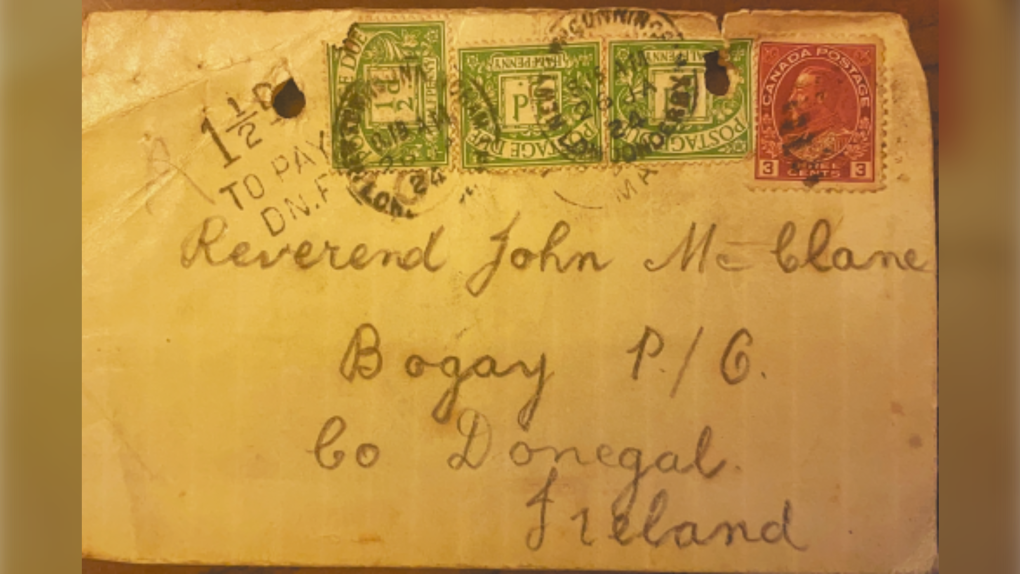 The envelope found in a bombed-out Irish solicitors’ office in 1972. (Source: Carol Cowie)
The envelope found in a bombed-out Irish solicitors’ office in 1972. (Source: Carol Cowie)
January 9th, 1924
Dear Sir,
I am writing these few lines to say I am down again, My thigh that I hurt in the summer is burst often and blood poison has set in. I am unable to work, could not work now if I was well as there is none. It’s 25 degrees below zero and deep snow. I have no place to go. A man here has taken me in but he just has a living barely for himself. So please, for the love of God, send me enough money to carry me through the winter or pay a doctor. I will now close hoping sir, you hear my plea. I ask you in the name of God.
I remain yours truly,
John Creswell
Vassar, Manitoba, Canada
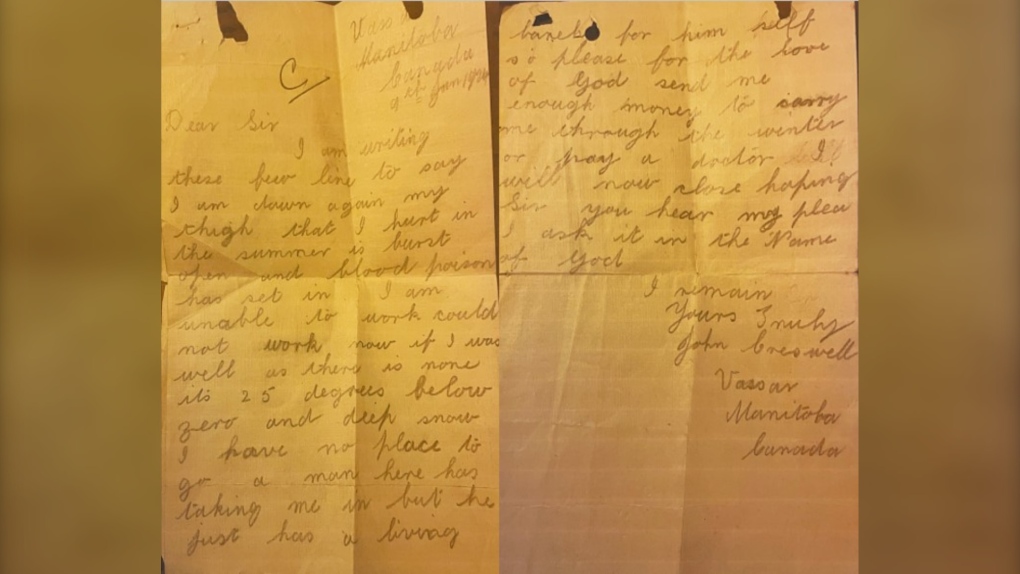 The letter John Creswell wrote on Jan. 9, 1924. (Source: Carol Cowie)
The letter John Creswell wrote on Jan. 9, 1924. (Source: Carol Cowie)
“It’s this tragic letter of somebody with this leg infection, begging for money, and kind of on death’s door,” Cowie said.
She said the note left her father wondering who John Creswell was, how he ended up in the southeastern Manitoba town, and ultimately, what happened to him.
“Did he live? Did he die?”
It remained a mystery floating in the back of her father’s head for the past 52 years—until Cowie returned to Ireland for a visit earlier this month to help care for her mother. She and her father were combing through some paperwork when he pulled out the letter.
“I was like, ‘Hold on—there’s two names, a location, and a date. We must be able to find records online,’” she recalled.
She dug through publicly available records like censuses, ship manifests, declaration forms, and genealogy websites, scouring the internet for mentions of Creswell, Rev. McLean, and anything that could help solve the decades-old puzzle.
“And after a few days, I started putting the pieces together.”
She learned Rev. McLean served as pastor of the only Presbyterian Church in Bogay from 1902 to 1946 and discovered he baptized a John Creswell in 1904.
That breakthrough led her to a birthdate – April 24, 1904 – and a breadcrumb trail on how Creswell ended up in Vassar, and, if he lived through the 1924 winter.
According to the National Archives of Ireland, 19-year-old John Creswell left Ireland in June 1923 on the passenger ship Saturnia. He arrived in Montreal about three weeks later with plans to settle in Weyburn, Sask. Creswell’s Canadian declaration form states he was a farm labourer and was only carrying about a pound when the ship docked in Quebec.
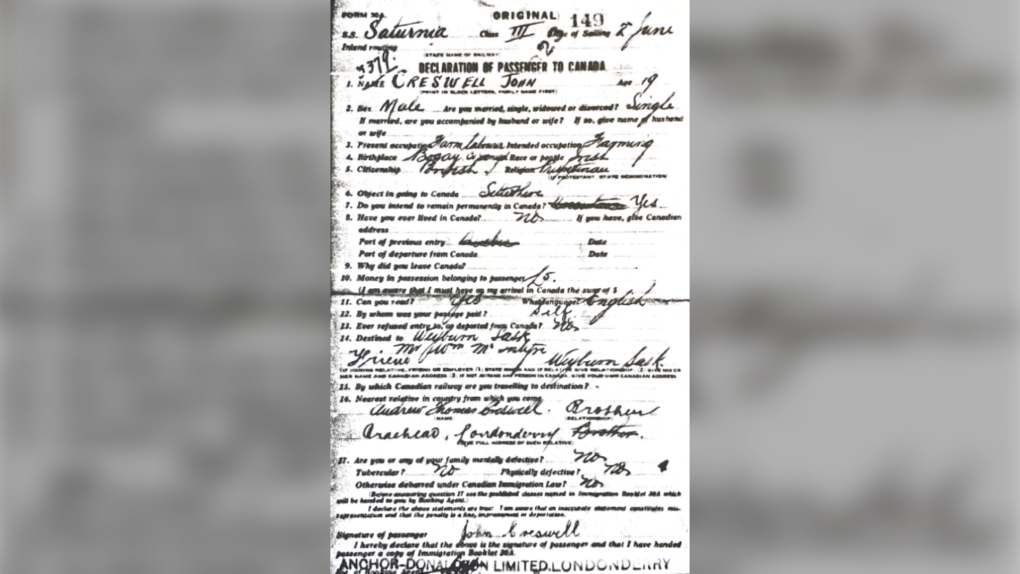 John Creswell’s declaration of passenger form dated June 2, 1923. (Source: Carol Cowie)
John Creswell’s declaration of passenger form dated June 2, 1923. (Source: Carol Cowie)
Cowie noted Creswell’s trek is a glimpse into what Irish immigrants went through during a chaotic era punctuated by Partition and a civil war.
“It speaks a lot about that period. To get on a boat by yourself at 19 years old and take that journey to Canada—it’s incredibly brave,” Cowie said.
Cowie said it’s unclear how or why Creswell ended up in Vassar.
The community is about two hours southeast of Winnipeg and only a few kilometres from the Minnesota border. It was founded in the late 1800s when CN Railway expanded lines through the region. Logging and farming were the primary industries in Vassar, and at the time Creswell wrote the letter, only a handful of buildings existed.
However, she did discover his journey didn’t stop there.
A search through Manitoba’s Vital Statistics database shows no one with the name John Creswell died here in 1924. However, U.S. Department of Labor records show a John Creswell moved to Michigan in 1927 via Canada.
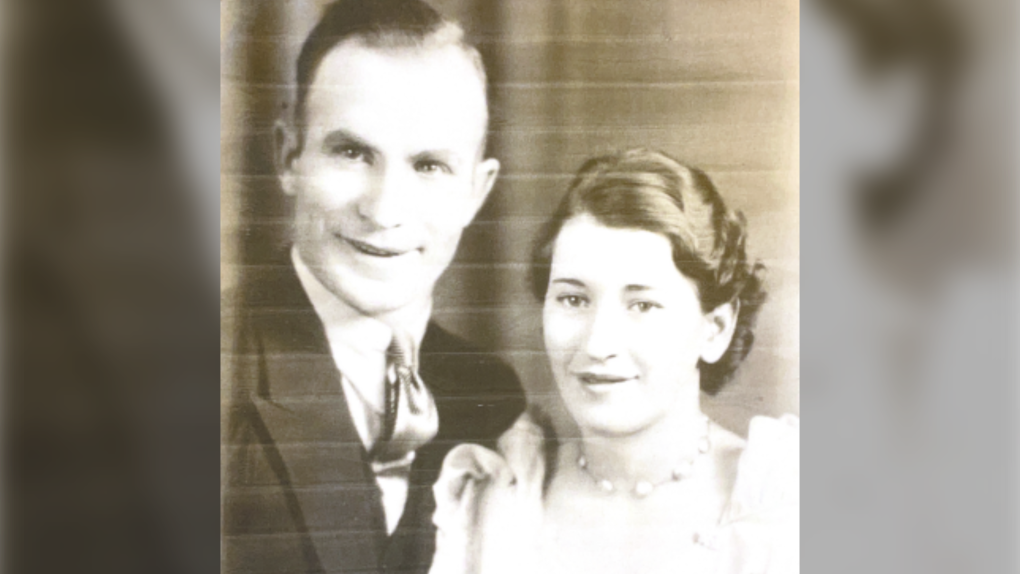 John Creswell and his wife Anna Mae are seen in an undated photo. (Source: Carol Cowie)
John Creswell and his wife Anna Mae are seen in an undated photo. (Source: Carol Cowie)
Cowie also learned Creswell eventually added a second ‘S’ to his last name (which may have hindered some of her research), worked as a power operator, married a woman named Anna Mae Roles, and had two children. He lived in Michigan and Nebraska before ultimately settling in California in the 1950s.
John Cresswell died in Los Angeles on May 29, 1986, and is buried at Forest Lawn Memorial Park. He was 82 years old.
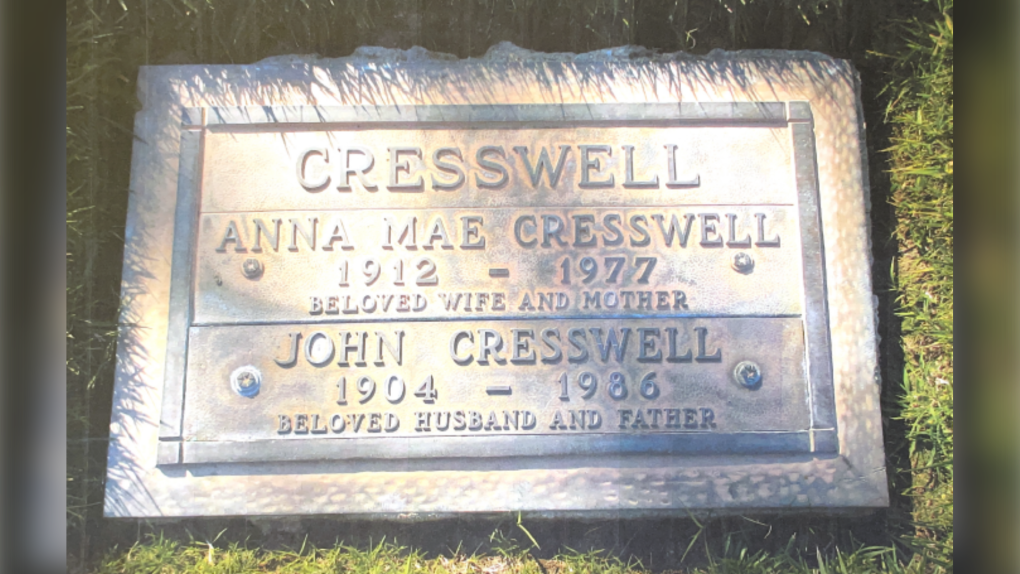 John and Anna Mae Creswell’s grave in Forest Lawn Memorial Park in Los Angeles, CA. (Source: Carol Cowie)
John and Anna Mae Creswell’s grave in Forest Lawn Memorial Park in Los Angeles, CA. (Source: Carol Cowie)
“When I found the picture of him and the picture of his grave, I found it quite personal—almost like I was discovering somebody I knew,” she recalled.
It’s an experience and journey she’s been able to share with her father.
“He just turned 80, so it was special for me to be able to say, ‘Look, here’s what happened to this person. [Creswell] didn’t die – he lived.’”
 Carol Cowie and her father Robert White are seen in an undated photo. (Source: Carol Cowie)
Carol Cowie and her father Robert White are seen in an undated photo. (Source: Carol Cowie)
Cowie marvelled at how much she’s been able to uncover with only a few nuggets of information—thanks to technological advancements over the past couple decades.
“I think it’s fascinating. I could find all this stuff out, with no background or anything, while sitting in the kitchen of my parents’ house,” she said. “I don’t know anything about investigative stuff, but just what the average person can find out about a life—I think that’s really incredible. Fifty years ago, that would have been impossible.”
Her efforts to connect with any of Creswell’s relatives have been challenging, and she admits she’s hit a dead end.
“The two sons didn’t seem to have any children, and they have since passed away.”
Cowie said she’ll continue to pour through online archives and records in hopes of answering the questions that still remain about Creswell’s life and his time in Manitoba.